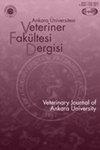兽医学院学生对人工智能概念及其在兽医实践中的应用的看法——以XXXX大学兽医学院为例
IF 0.9
4区 农林科学
Q3 VETERINARY SCIENCES
引用次数: 0
摘要
与其他卫生领域一样,人工智能在兽医领域也是一个发展中的概念。开展这项研究是为了确定安卡拉大学兽医学院(土耳其最成熟的兽医学院)学生对人工智能概念及其在兽医实践中的应用的知识水平。为此,我们对529名希望参与研究的学生进行了在线问卷调查,涵盖了学院的所有年级。问卷由两部分组成。在第一部分中,有10个问题,包括人口统计,计算机使用水平,关于人工智能概念的知识等。第二部分由26道李克特式5分题组成,以确定学生对人工智能应用的看法。采用统计检验对数据进行分析。因此,参与研究的学生对人工智能有部分了解(52.9%)。他们知道关注人工智能的发展对职业的重要性(45.2%)。他们认为人工智能应用将提高他们的专业技能(53.5%)。他们认为机器人无法取代兽医(36.7%),人工智能未来不会导致兽医失业(35.3%)。此外,他们认为人工智能可能会引发伦理问题(39.3%),并认为利用这项技术开发的应用应该在伦理意义上进行开发(42.4%)。因此,学生们在认为人工智能将对兽医领域产生积极影响的同时,也认为人工智能会带来负面的伦理影响。可以得出结论,在兽医学院开设人工智能应用选修课并开展进一步的研究将是有益的。本文章由计算机程序翻译,如有差异,请以英文原文为准。
Views of Veterinary Faculty Students on the Concept of Artificial Intelligence and Its Use in Veterinary Medicine Practices: An Example of XXXX University Faculty of Veterinary Medicine
Artificial intelligence is a developing concept in the field of veterinary medicine, as in other health fields. The study was carried out to determine the knowledge levels of the students of Ankara University Faculty of Veterinary Medicine, which is the most established veterinary faculty in Türkiye, on the concept of artificial intelligence and its use in veterinary practices. For this purpose, an online questionnaire was applied to a total of 529 students who wanted to participate in the study, covering all grades of the faculty. The questionnaire consists of two parts. In the first part, there are 10 questions including demographics, level of computer use, knowledge about the concept of artificial intelligence, etc. The second part consists of 26 5-point Likert-type questions to determine students' thoughts on artificial intelligence applications. Data were analyzed using statistical tests. Consequently, the students participating in the study are partially knowledgeable about artificial intelligence (52.9%). They know the importance of following the developments in artificial intelligence for the profession (45.2%). They think that artificial intelligence applications will improve their professional skills (53.5%). They have the opinion that a robot cannot replace a veterinary surgeon (36.7%) and artificial intelligence cannot cause unemployment in veterinary medicine in the future (35.3%). In addition, they believe that artificial intelligence can cause ethical problems (39.3%) and that applications made with this technology should be developed in an ethical sense (42.4%). As a result, while the students think that artificial intelligence will have positive effects in the field of veterinary medicine, they also think that artificial intelligence can bring negative ethical implications. It can be concluded that including elective courses on artificial intelligence applications in veterinary faculties and conducting further research on the subject would be beneficial.
求助全文
通过发布文献求助,成功后即可免费获取论文全文。
去求助
来源期刊
CiteScore
1.50
自引率
0.00%
发文量
44
审稿时长
6-12 weeks
期刊介绍:
Ankara Üniversitesi Veteriner Fakültesi Dergisi is one of the journals’ of Ankara University, which is the first well-established university in the Republic of Turkey. Research articles, short communications, case reports, letter to editor and invited review articles are published on all aspects of veterinary medicine and animal science. The journal is published on a quarterly since 1954 and indexing in Science Citation Index-Expanded (SCI-Exp) since April 2007.

 求助内容:
求助内容: 应助结果提醒方式:
应助结果提醒方式:


